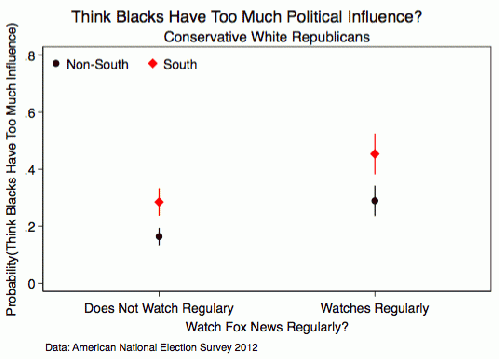Watching Bill O'Reilly's network seems to have a powerful effect on viewers' racial attitudes. (image via Crooks & Liars)
Since the election of Obama in 2008, Americans have become increasingly polarized about racial issues. At the same time, Americans have also become more polarized in their news media viewing habits. In the wake of horrifying events like the racially motivated mass murder in a Charleston church, some have connected these trends; Jon Stewart (Comedy Central, 3/19/15), for example, criticized Fox News for ignoring the reality of systemic racism.
Is there any merit to such criticisms? Do media and racial polarization reinforce each other? Is there a connection between news media viewing habits and attitudes about racial equality? Based on an analysis of the American National Election Studies 2012 dataset, we find that white respondents who regularly watch Fox News are more likely to express attitudes of symbolic racism and racial resentment. This is especially true of those Fox News viewers who live in the South.
One common expression of racial resentment is the stereotype that black people have disproportionate influence over the levers of power. Though people of color are far more likely to live under an unrepresentative city council and have far less influence over policy, many racist whites wrongly think that government disproportionately benefits non-whites through social programs.
Our analysis suggests that regular Fox News viewers are more likely to hold such opinions, even after controlling for other factors such as individual race, age, income, education, partisanship, ideology, religiosity and geography. In the graph below, we compare conservative white Republicans who watch Fox News regularly to those who do not. The results show that regular Fox News viewers are significantly more likely to think that blacks have too much political influence. Those Fox News viewers who live in the South are the most likely to hold such attitudes.
The graph indicates that watching Fox News makes a non-Southerner just as likely to think blacks have too much political power as a Southerner who doesn't watch Fox Newsregularly. These findings give credence to the idea that Fox News coverage that stokes such racist mythologies (see, e.g., Extra!, 9/13) may indeed be reinforcing negative racial stereotypes.
Increasingly, racism hides behind an ideology of "colorblindness," a phenomenon sociologist Eduardo Bonilla-Silva discusses in his book Racism Without Racists. ANES has several questions that can help identify such colorblind racism. One asks respondents whether "it's really a matter of some people not trying hard enough; if blacks would only try harder, they could be just as well off as whites." The graph below shows that Republicans are significantly more likely to agree with this statement compared to Democratic partisans.
Among those who watch Fox News regularly, the same pattern holds, but with an additional twist. Democrats who watch Fox News regularly are far more likely to agree that blacks must work harder than Democrats who do not watch Fox News. In fact, their views become indistinguishable from those of Republicans are who do not watch Fox News.
In another assessment of whether respondents view structural racism as a barrier to black upward mobility, respondents are asked if they agree that "Irish, Italians, Jewish and many other minorities overcame prejudice and worked their way up. Blacks should do the same without any special favors." Here, being a regular viewer of Fox News significantly predicts an affirmative response.
Controlling for other important factors, Fox News viewers are much less likely to agree that structural racism is a barrier to black upward mobility. Fox News viewers are also more likely to disagree that "generations of slavery and discrimination have created conditions that make it difficult for blacks to work their way out of the lower class," and less likely to agree that "'over the past few years, blacks have gotten less than they deserve."
In total, of the 10 racially related variables examined, five showed a statistically significantFox News effect. While Fox News viewership appears to influence views related to racial resentment, the effects on perceptions of discrimination, and stereotypes about intelligence and work ethic, are not statistically significant: Fox News didn't predict whether respondents think discrimination against blacks is still a problem, or whether they stereotyped black people as unintelligent.
(Note: You can view every article as one long page if you sign up as an Advocate Member, or higher).







